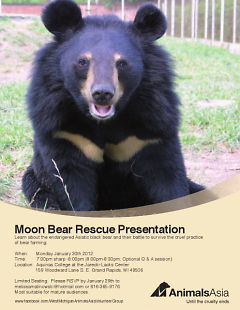Event Information
January 30 from 7 to 8:30 pm
Aquinas College's Jarecki-Lacks Center
Because seating is limited, RSVP by Jan. 29,
either via email or by phone (616-365-9176)
The Bear Facts:
(Courtesy of animalsasia.org)
Name: Asiatic black bear (Ursus selenarctos Thibetanus)
-
Affectionately called moon bears because of the beautiful yellow crescent moon found on the bears' chests.
-
Moon bears have thick, shaggy fur, ranging in color from ebony black to a lighter brown-black, and big round ears. They have short, strong claws which enable them to climb with ease.
-
Weighing 300 to 440 pounds, males grow to around twice the size of females, which weigh 130 to 285 pounds in the wild. However, the females can often be dominant and can usually be distinguished by the thicker ruff of fur around their necks.
-
Moon bears are typically 4 to 6 feet tall.
-
Moon bears are found across the Asian continent from Pakistan to Japan. They often live at high altitudes and prefer heavily forested areas.
-
Moon bears are classified as carnivores, although they follow an omnivorous diet. Their diet varies according to location and season, but predominantly consists of vegetables, fruits, nuts, insects, small mammals, birds and carrion. Occasionally, moon bears may attack livestock or raid crops.
-
Moon bears are highly intelligent and have a large vocabulary, making clucking sounds during play, "tut-tut-tut" sounds when cautious and huffing sounds when warning or about to attack. Females are more vocal than males.
-
Moon bears tend to be solitary, crepuscular (active at dawn and dusk) animals once they reach adulthood. They can survive for up to 35 years in captivity, though usually live for 25 to 30 years in the wild.
-
Moon bears love to makes dens in hollow logs and caves and also sleep in trees. They often hibernate between November and March/April (although this can vary depending on their specific range.)
-
Moon bears may also migrate and spend the warmer months of the year at higher altitudes and then descend to the lowlands during colder months.
-
Moon bears tend to give birth to twins in April or May (but are also known to give birth earlier in hibernation) and although weaned by 4 to 6 months, the cubs stay with their mothers for their first two years.
-
Moon bears are the most valued bears for traditional medicine, partly because the species was so abundant in the areas where traditional medicine originated. Their range extends from Iran to Japan and across Southeast Asia and it is estimated that there are as few as 16,000 left in the wild worldwide.

